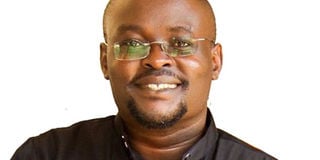Uganda is not Kenya, but…

Mr Arthur Larok is the federation development director, ActionAid International
What you need to know:
It is not yet uhuru in Kenya, but their democratic project seems to be progressing
On September 13, Kenya witnessed yet another peaceful transfer of instruments of power from one president to another. In attendance and witness to this important event was Uganda’s ruler of 37 years, Yoweri Museveni, who has been in power longer than the eight presidents Uganda has had since Independence combined.
Right from the campaign period to the elections and happenings after, Ugandans marvelled about Kenya’s show of democratic progress. Unlike elections in Uganda that for all intents and purposes are akin to war, Kenya’s elections were generally peaceful.
Armoured military vehicle Ugandans are accustomed to on the streets of Kampala before, during and after elections were nowhere in the Kenyan elections. There was no tear gas, opposition leaders were not put under house arrest as often happen to Dr Kizza Besigye, Bobi Wine and others.
The Independent Elections and Boundary Commission (IEBC) of Kenya announced results most Kenyans already knew and if some Venezuelan interfered, the Supreme Court was not able to confirm.
What Uganda can learn
First, was the national and patriotic appeal during the campaigns by contending coalitions: Azimio la Umoja and Kenya Kwanza. Their manifestos contained sound policy commitments while their slogans rallied Kenyans in their diversity. The near 50:50 split demonstrated, in part, how their messages resonated with millions. The campaigns were largely issue-based unlike in several elections in Uganda where one easily gets lost in the violence, bribery, unhelpful rhetoric and personal attacks.
Second, the level of political cooperation was admirable and perhaps reflects a kind of political maturity in Kenya. Politics is about negotiating interests. Across the border, in every election cycle Ugandans are treated to half-hearted or failed attempts at political cooperation and common agendas are sacrificed at the altar of big egos and logos.
In Kenya, one would be forgiven for thinking the concluded presidential contest was between opposition, and conversely one between government candidates. Mr Raila Odinga, the opposition candidate, was backed by incumbent president Uhuru Kenyatta and William Ruto, the deputy president, had support from within and outside the establishment. In Uganda, as in most of Africa, we often exaggerate our differences.
Third is the relative independence of Kenya’s institutions. Despite several challenges it faced, the IEBC demonstrated a level of independence unseen in Uganda. Even when four out of the seven IEBC commissioners disowned the final results, in many respects the ruling of the Supreme Court vindicated the IEBC.
The Supreme Court itself, while disappointing many with threatening and dismissive language in delivering its judgment, their decision was largely respected. In Uganda, the Supreme Court rulings in presidential election petitions in 2001, 2006 and 2016 did not inspire confidence. Kenya’s security agencies did not interfere in the elections and yet in Uganda, their interference is the norm rather than the exception.
Fourth is the agony of the winner-take-all system. This is the elephant in the room that calls for Africanising rather than democratising Africa. It is a wider lesson for Africa. The question of whether neo liberal democracy anchored around electoral processes that continue to entrench a winner-take-all political tradition is relevant for Africa remains alive.
About 6.9 million people voted Mr Odinga compared to 7.2 million for Mr Ruto, nearly half of the population will feel unrepresented by the president. Worse still, unlike in Uganda where the President controls Parliament and local councils. In Kenya the balance of power is split at all levels – senate, parliament and counties.
It is not yet uhuru in Kenya, but their democratic project seems to be progressing. Its predictable transition inspires confidence for investment and stability, while Uganda’s transition uncertainties pose serious questions for our long-term stability, prosperity and integration.
Arthur Larok




